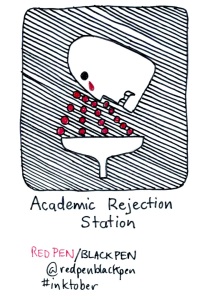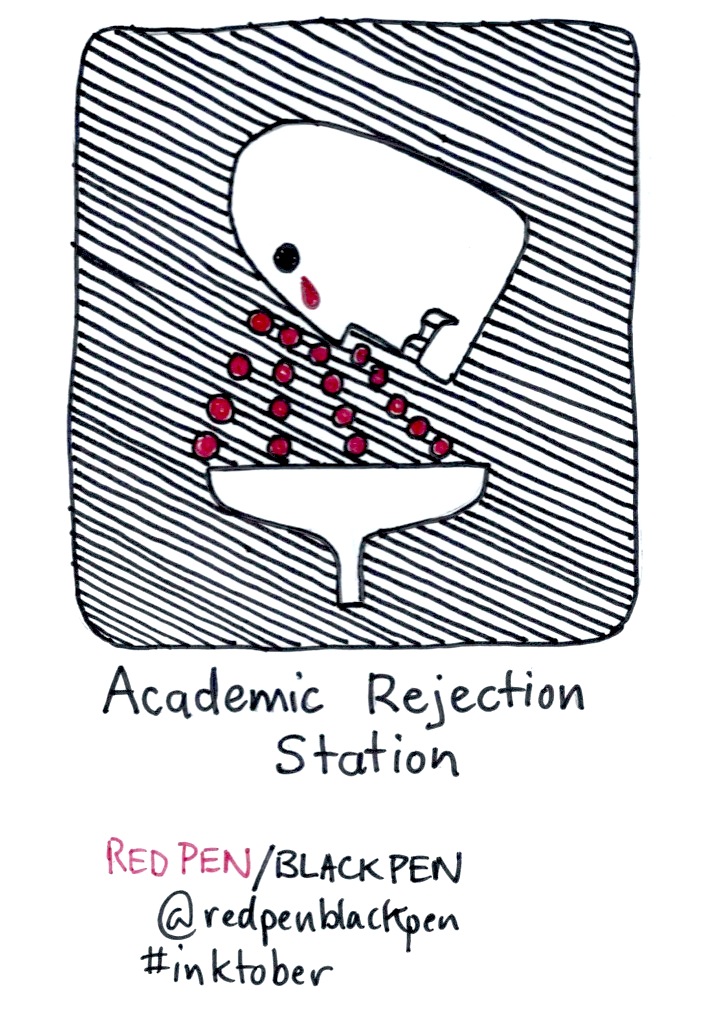At the end of last year, I reached an academic milestone: I got my name on an office door. I was pretty stoked, and posted a short video of myself, grinning like a maniac in front of said victory door.
But it occurred to me that the post didn’t capture the reality of my academic journey so far.
Sure, I’d just started a cool job that I like very much. I also spent the majority of the last year either unemployed or on short-term, part-time, or casual contracts. I was resoundly rejected from multiple academic positions and fellowship grants, only making it through to the interview stage once. And I spent a lot of time feeling really, really crap and completely wracked by self-doubt. It sucked.
So today’s message is directed to other early career researchers on the employment roundabout: if you’re finding it hard, you’re not alone.
Round and round we go
A quick introduction to early career research (ECR) contracts, for those outside our ivory-towered realm. Most of the available jobs are contract work, and most are short, ranging from six months to three years (Five is exceptionally rare. 1-2 years is more the norm). Casual work is common. Contract extensions are often alluded to, but never assured.
Short-term academic contracts are a tricky beast. You’re supposed to behave as if you’re not going to suddenly become unemployed. You don’t say ‘no’ to things just because they are beyond the end of your contract. You make long-term plans, collaborations and consulting projects. You work hard. You be excellent. And you hope it’ll work out.
If it doesn’t, you may experience some or all of the following.
Phase 1: Indulging in the melancholy
In early 2016, I found out my contact wouldn’t be extended. Technically, I didn’t get fired, but it sure felt like it.
I’d like to say I handled it with maturity and dignity, but no. I flitted between anger, disbelief, despair and whatever it’s called when you hide in a pillow fort drinking wine, watching Star Wars and practicing sad Wookie noises (I assume there’s a German word for this). The picture becomes all the more pitiful when I tell you that I can’t roll my ‘R’s.
I thought I’d ticked all the boxes. I thought I’d jumped through all the hoops. And it still didn’t work out. I was shattered.

Phase 2: A big world of no.
Due to the short-term nature of contracts, early career researchers are almost constantly looking for work. Applying for grants and fellowships is rough. It’s not just a matter for shooting off a few resumes. Applications often require superhero selection criteria, a proposed research project (as long as 8 pages), and proof of support from existing staff (signed letters). These mammoth applications can take days and days (or, more accurately, all of your nights and weekends) to complete, making rejection all the more gutting.
I faced a steady stream of rejection, including one email from the university’s HR department saying “Your HR case is now closed. Please create a new one if you need any assistance”. Ouch.
 When I did receive feedback, it was generally positive – “You’re great. Just keep doing what you’re doing.” It should have been uplifting, but it wasn’t, because doing what I was doing didn’t seem to be working out and everyone else seemed to be 3 years ahead of me doing what they were doing. I was good, but not as good as that guy.
When I did receive feedback, it was generally positive – “You’re great. Just keep doing what you’re doing.” It should have been uplifting, but it wasn’t, because doing what I was doing didn’t seem to be working out and everyone else seemed to be 3 years ahead of me doing what they were doing. I was good, but not as good as that guy.
We’re a pretty tight knit bunch, and love a bit of gossip, so it was easy to find out who scored interviews. Then I’d look at their track records and yell at my computer. Then I’d look at everybody else’s track record and yell some more. For those following along at home, it’s at this point that you might like to develop a nemesis.
I was sad and embarrassed and certain that I just wasn’t cut out for this. See Phase 1.
Phase 3: Fine, if you don’t want me, I don’t want you
I briefly considered a raft of unlikely career paths. Surf instructor, baker, flight attendant, bike mechanic – the furthest it was from my skill set, the better.
Phase 4: OK, I’ll stay. You don’t even have to pay me.
Two things dawned on me. #1. I couldn’t stay in my pillow fort forever. It’s not as comfortable as it sounds. #2. I really wanted to stay in academia if I could.
For ECRs, sudden, unexpected unemployment leaves you with two options. You can leave, abandoning your projects and collaborations (see Phase 3). Or, you can wait it out and keep working for free.
Since I’d decided I wanted to stay, I stepped into the ‘all work, no pay’ zone. Honestly, I didn’t really feel I had another option. My students needed feedback. I still had to travel to Canada for a workshop that I had co-organised months ago. I’d agreed to speak at three different events, and had reviews due or papers to re-submit. My workload and commitments hadn’t changed. I was just no longer employed.
A quick side note: I’m aware how lucky I was that I could afford to do this. We aren’t all in a position to go without income for a while. Coming from being a full-time student doesn’t leave you with any kind of savings that you can dip into. If you have people in your life that depend on your income, then ‘leisurely working on your own papers’ for a few months isn’t a real option.

Phase 5: It’s alive!!!
I hung around long enough that little contracts began to come in. A lecture here, some research assistant work there, covering for someone one maternity leave etc. I stitched six contracts together to create a Frankenstein monster of a full-time position. This was enough to stay in the game and get paid, but was absoloutely exhausting and made it near-impossible to maintain any semblance of a cohesive research program.
Also, the admin is hell. It can take longer to fill out the paperwork than to do the job itself.
Phase 6: Eyeing job offers with suspicion.
Eventually, a full-time position started to materialize, though, so low was my self-esteem that I didn’t notice, and then assumed that there must have been some kind of mistake. I’d become cynical and wary of phantom employment. But all at once, there were contracts to sign and my name on a door.
Pulling back the curtain
Maybe a post professing my inability to handle the academic job market wasn’t a great idea…especially since I’ll probably go through it all again in a few years time. But it didn’t seem right to pretend that it was easy. For a while, I felt like I must have been, objectively speaking, the worst researcher who ever lived.
Struggle street is a lonely place to be. It often feels like everyone else has their shit together while I just got my shoelaces caught in the wheels of my desk chair again (definitely just a colourful analogy, and not something that actually happened to me the other day). Knowing that you’re not alone doesn’t deal with the underlying issues facing early career academics. But by pulling back the curtain a bit, I hope others can relate, and perhaps not feel like they’re uniquely terrible.
I don’t have solutions. I don’t have advice. I just have your back if you want to talk about it. Come find my door. You’ll figure out which one it is.

Just wanted to thank you for the honesty in your post Kylie. As always, a good read too. Wishing you all the best.
LikeLiked by 1 person
Fantastic blog thanks Kylie! It’s great (and brave!) that you were so honest and personal. It sure is useful to hear about your experience! Thank you!
LikeLiked by 1 person
Thanks for the post Kylie! Nice to know I’m not alone as I work three contracts, surrounded by the carcasses of rejected grant proposals and job applications 🙂
LikeLiked by 1 person
Well done Kylie, your frankness (and I don’t mean Frankensteinness) makes for a compelling read 🙂
LikeLike
““Your HR case is now closed. Please create a new one if you need any assistance”. Hilarious — in that awful, awful way. Thanks Kylie. Great post.
LikeLike
Thanks for sharing your story Kylie. Many of your experiences reflect mine and many others I’m sure! Rachel
LikeLike
Pingback: Recommended reads #97 | Small Pond Science